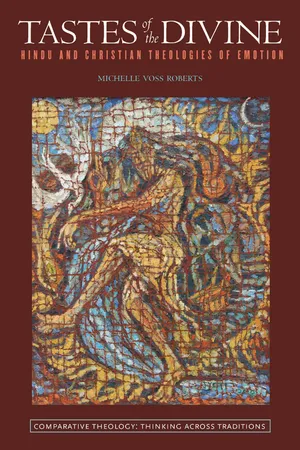
- 296 pages
- English
- ePUB (mobile friendly)
- Available on iOS & Android
About this book
The intensity and meaningfulness of aesthetic experience have often been described in theological terms. By designating basic human emotions as rasa, a word that connotes taste, flavor, or essence, Indian aesthetic theory conceptualizes emotional states as something to be savored. At their core, emotions can be tastes of the divine. In this book, the methods of the emerging discipline of comparative theology enable the author's appreciation of Hindu texts and practices to illuminate her Christian reflections on aesthetics and emotion.Three emotions vie for prominence in the religious sphere: peace, love, and fury. Whereas Indian theorists following Abhinavagupta claim that the aesthetic emotion of peace best approximates the goal of religious experience, devotees of Krishna and medieval Christian readings of the Song of Songs argue that love communicates most powerfully with divinity. In response to the transcendence emphasized in both approaches, the book turns to fury at injustice to attend to emotion's foundations in the material realm. The implications of this constructive theology of emotion for Christian liturgy, pastoral care, and social engagement are manifold.
Frequently asked questions
- Essential is ideal for learners and professionals who enjoy exploring a wide range of subjects. Access the Essential Library with 800,000+ trusted titles and best-sellers across business, personal growth, and the humanities. Includes unlimited reading time and Standard Read Aloud voice.
- Complete: Perfect for advanced learners and researchers needing full, unrestricted access. Unlock 1.4M+ books across hundreds of subjects, including academic and specialized titles. The Complete Plan also includes advanced features like Premium Read Aloud and Research Assistant.
Please note we cannot support devices running on iOS 13 and Android 7 or earlier. Learn more about using the app.
Information
Table of contents
- Cover
- Half title
- Series Page
- Title
- Copyright
- Dedication
- Contents
- List of Abbreviations
- Sanskrit Pronunciation Guide
- Preface
- Acknowledgments
- Epigraph
- Introduction: Rasa
- I: Peace
- II: Love
- III: Fury
- IV: Tastes of the Divine
- Notes
- Glossary of Sanskrit Terms
- Bibliography
- Index
- Series List